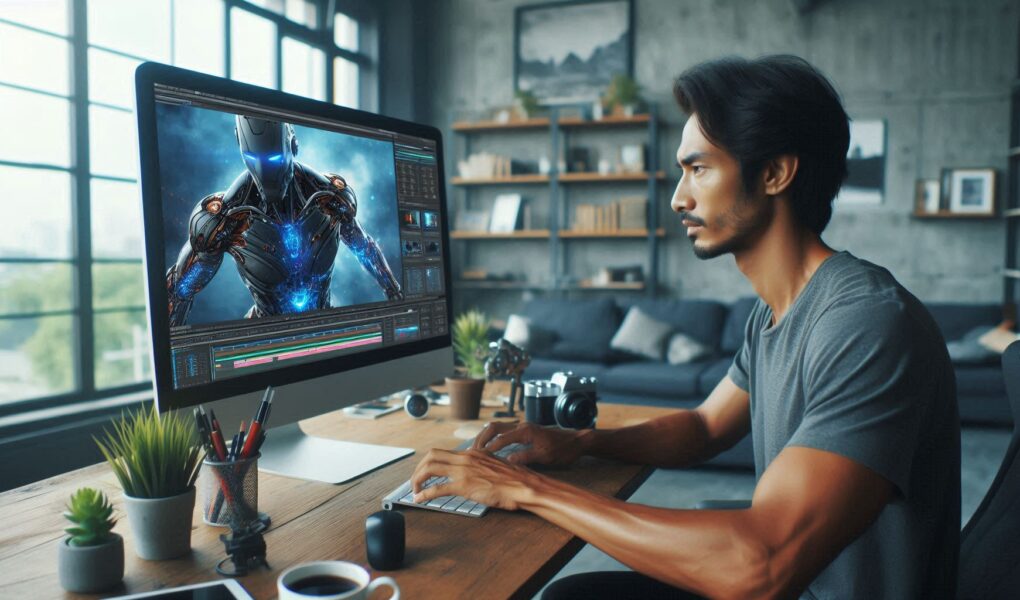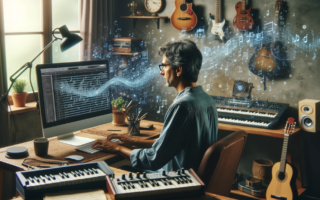The world of film production is one of creativity, innovation, and collaboration. From the initial spark of an idea to the final edit, creating a film involves a complex dance of various elements.
In recent years, artificial intelligence (AI) has started playing a significant role in this intricate process. You might be wondering: how exactly is AI influencing film production, and what does this mean for the future of cinema?
Let’s get into this fascinating topic and explore AI’s growing influence in film production.
The Changing Landscape of Film Production
Film production has always been a dynamic field, evolving with technology and artistic trends. From the advent of sound and color to digital filmmaking and CGI, each technological advancement has reshaped the way films are made.
Today, AI is stepping into the spotlight, promising to revolutionize several aspects of film production. But before we get into the nitty-gritty, let’s take a quick look at how film production traditionally works and where AI fits into the picture.
The Traditional Film Production Process
Creating a film is a multi-faceted process that involves several stages:
- Pre-Production: This phase includes scriptwriting, storyboarding, casting, location scouting, and planning. It’s where the foundational elements of the film are established.
- Production: The actual filming takes place during this phase. It involves directing, acting, cinematography, sound recording, and other on-set activities.
- Post-Production: After filming wraps, the film enters the post-production stage. This includes editing, sound design, visual effects, color correction, and finalizing the film for distribution.
Each of these stages requires a combination of creativity, technical skills, and coordination among various team members. AI is now making its way into these areas, offering new tools and possibilities.
AI in Scriptwriting: Crafting the Perfect Story
One of the first steps in film production is crafting the script. This is where AI starts to make a noticeable impact.
AI-Driven Storytelling
AI tools can assist writers in brainstorming ideas, developing plotlines, and creating dialogue. By analyzing existing scripts and identifying successful narrative structures, AI can suggest plot twists, character arcs, and dialogue that aligns with the desired genre or tone.
For example:
- Idea Generation: AI can generate story ideas based on prompts or existing content. This helps writers explore new angles and themes.
- Dialogue Enhancement: AI can assist in refining dialogue, ensuring it sounds natural and engaging.
Case Studies and Examples
Several screenwriters and production teams are already experimenting with AI-driven tools. For instance, AI has been used to analyze successful scripts to help writers understand what makes a story compelling. Some projects have even used AI to generate complete scripts, providing a starting point for further human refinement.
AI in Casting: Finding the Perfect Fit
Casting is another crucial stage in film production. Finding the right actors for each role can make or break a film. AI is increasingly being used to streamline and enhance the casting process.
AI-Powered Casting Tools
AI can analyze actors’ previous performances, assess their suitability for different roles, and even predict how well they might fit into a new project. Here’s how:
- Performance Analysis: AI algorithms can evaluate actors’ past performances to match them with roles that suit their strengths and screen presence.
- Role Matching: By analyzing script details and character profiles, AI can suggest actors who align with the vision of the director and writer.
Enhancing the Casting Process
AI can also help casting directors by predicting audience reactions and assessing the potential chemistry between actors. This can be especially useful in ensemble casts where the interaction between actors is crucial.
AI in Production: Streamlining Filming and Directing
During the production phase, AI can be a valuable asset in several ways.
AI in Cinematography
Cinematography involves capturing the visual essence of a film. AI tools can assist by:
- Camera Angles and Shots: AI can suggest optimal camera angles and shot compositions based on the script and scene requirements.
- Real-Time Adjustments: Some AI systems can analyze scenes in real-time and suggest adjustments to lighting, camera settings, and shot composition.
AI in Directing
Directing involves guiding actors and crew to bring the script to life. AI can assist directors by:
- Script Analysis: AI can analyze the script and suggest directorial approaches to emphasize key themes or emotions.
- Actor Performance: AI can offer feedback on actors’ performances, helping directors fine-tune their direction.
AI in Post-Production: Editing and Visual Effects
The post-production phase is where a film truly comes together. AI plays a significant role here, offering tools to enhance editing and visual effects.
AI-Powered Editing
Editing is a meticulous process that involves selecting the best takes, cutting scenes, and ensuring a coherent flow. AI tools can help by:
- Automated Editing: AI can automatically assemble rough cuts by selecting the best takes and arranging scenes based on the script.
- Scene Analysis: AI can analyze scenes to identify key moments and suggest edits to enhance storytelling.
AI in Visual Effects (VFX)
Visual effects are crucial for creating stunning visuals and enhancing the storytelling experience. AI contributes by:
- Generating VFX Elements: AI can create realistic visual effects, such as explosions or digital environments, with high efficiency.
- Enhancing Footage: AI can enhance footage by improving resolution, removing noise, and adding details.
The Benefits and Challenges of Using AI in Film Production
Benefits
- Increased Efficiency: AI can streamline various aspects of film production, reducing time and effort required for tasks like editing and casting.
- Enhanced Creativity: By providing new tools and insights, AI can spark creativity and offer fresh perspectives on storytelling and filmmaking.
- Cost Savings: AI can potentially reduce production costs by automating repetitive tasks and optimizing workflows.
Challenges
- Lack of Human Touch: While AI is powerful, it may lack the emotional depth and nuanced understanding that human creatives bring to film production.
- Ethical Concerns: The use of AI in creative processes raises ethical questions about authorship and the role of human creativity in art.
- Data Dependency: AI relies on data and algorithms, which means its outputs are influenced by existing patterns and may not always offer innovative solutions.
The Future of AI in Film Production
As technology continues to evolve, the role of AI in film production is likely to expand. Here’s what we might expect in the future:
More Advanced AI Tools
We can anticipate more sophisticated AI tools that offer deeper insights and more refined capabilities. For example, AI might become better at understanding emotional nuances and predicting audience reactions.
Integration with Human Creativity
The future of AI in film production will likely involve a collaborative approach, where AI enhances human creativity rather than replacing it. This could lead to a more dynamic and innovative filmmaking process.
Exploring New Artistic Possibilities
AI might open up new artistic possibilities, allowing filmmakers to experiment with novel storytelling techniques, visual effects, and production methods.
Conclusion
AI’s influence in film production is growing, offering new tools and opportunities at every stage of the process. From scriptwriting and casting to production and post-production, AI is reshaping how films are made. While there are challenges and limitations, the potential benefits are substantial.
As we look to the future, embracing AI’s capabilities while maintaining a focus on human creativity and artistry will be key. The intersection of technology and creativity promises to lead to exciting developments in the world of film.
So, whether you’re a filmmaker, a film lover, or just curious about the future of cinema, keep an eye on how AI continues to shape the industry.
Here’s to a future where technology and storytelling come together to create even more captivating and innovative films!

